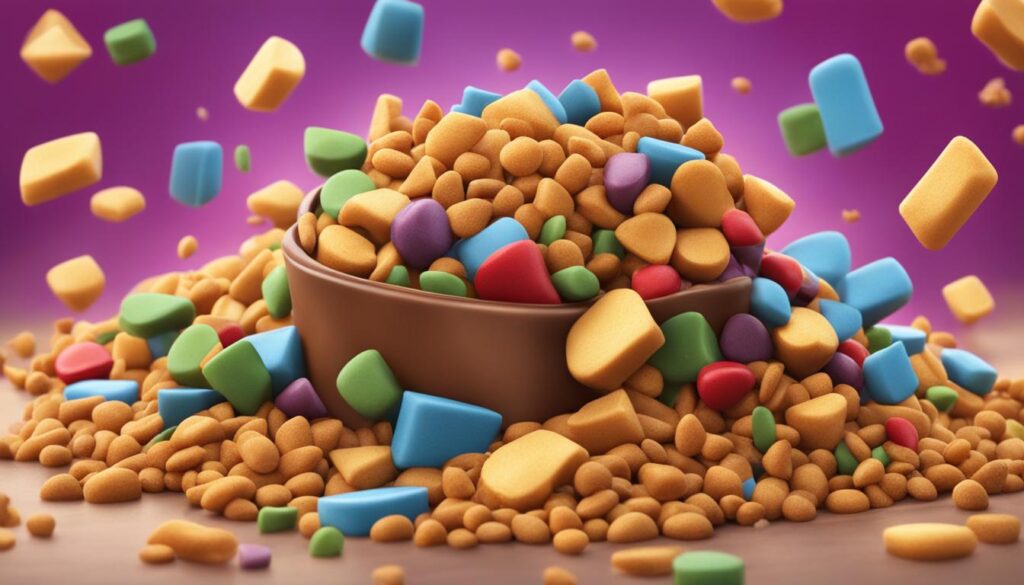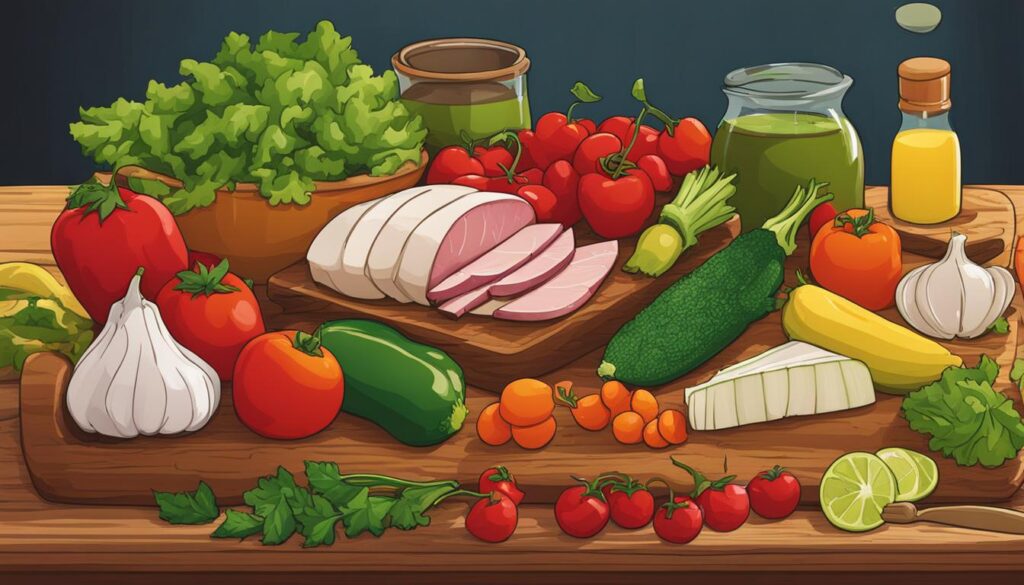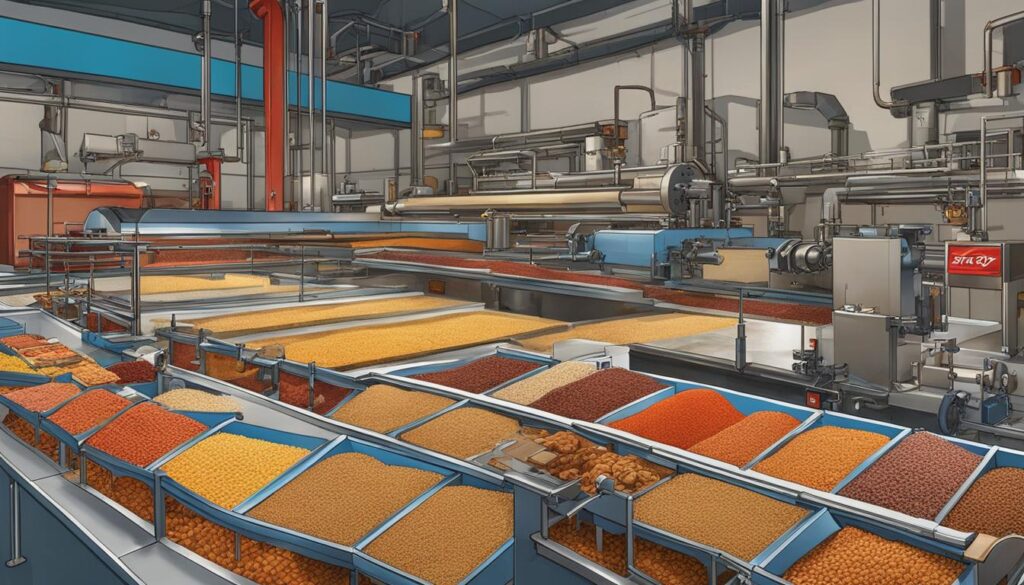Are you confused about what to feed your furry friend? Let’s set the record straight and debunk some common dog nutrition myths. It’s time to separate fact from fiction and provide you with the real dog nutrition facts!
When it comes to feeding your dog, you may have heard conflicting opinions about processed pet food (kibbles) and home-cooked meals. But fear not, we’re here to guide you through the maze of dog nutrition.
One of the biggest misconceptions is that kibbles are not as nutritious as home-cooked meals. The truth is, kibbles provide a complete and balanced diet for your furry companion. They contain a mix of meat, grains, vegetables, vitamins, and minerals, ensuring consistent nutrient content.
On the other hand, home-cooked meals require careful planning to meet your dog’s dietary needs. They may lack essential nutrients like taurine, which is important for heart health. So, before you start whipping up a homemade feast, consult with your veterinarian to ensure your dog’s nutritional requirements are met.
Now that we’ve debunked some dog nutrition myths, it’s time to dive deeper into the nutritional value of processed pet food (kibbles) in Section 2. Hang tight, we’re about to unravel the secrets behind your dog’s balanced diet!
The Nutritional Value of Processed Pet Food (Kibbles)
Processed pet food, commonly known as kibbles, is a popular choice for feeding dogs due to its nutritional value and convenience. Kibbles are carefully formulated to provide a complete and balanced diet for dogs, ensuring that they receive all the essential nutrients they need to thrive. These include a mix of high-quality ingredients such as meat, grains, vegetables, and essential vitamins and minerals.
The manufacturing process of kibbles ensures consistent nutrient content, making it easier for pet owners to meet their dog’s dietary needs. This consistency is particularly important for dogs with specific health conditions or dietary restrictions. Furthermore, kibbles have a long shelf life, allowing pet owners to store them without worrying about spoilage.
Feeding dogs with kibbles also offers convenience and cost-effectiveness. The pre-portioned nature of kibbles eliminates the need for measuring and preparing meals from scratch, saving time and effort. Additionally, kibbles are available in a wide range of options to accommodate different breed sizes, life stages, and specific dietary requirements.
Providing a balanced diet is crucial for your dog’s overall health and well-being. While kibbles are an excellent option, it’s essential to consult with a veterinarian to determine the specific nutritional needs of your dog and ensure that the chosen pet food aligns with those requirements.


Table: Comparison of Nutritional Value in Processed Pet Food
| Nutrients | Kibbles | Home-Cooked Meals |
|---|---|---|
| Protein | High-quality meat as a primary source | Dependent on ingredients used |
| Carbohydrates | From whole grains for sustained energy | Dependent on ingredients used |
| Fats | Balanced ratio of essential fatty acids | Dependent on ingredients used |
| Vitamins and Minerals | Added in optimal amounts | May require supplementation |
| Taurine | Present in adequate levels | May require supplementation |
Processed pet food, or kibbles, provide a convenient and nutritionally complete option for feeding dogs. It’s important to consider the specific nutritional needs of your dog and consult with a veterinarian for personalized recommendations.
By feeding your dog with high-quality kibbles, you can be confident that they are receiving the necessary nutrients to support their overall health and vitality.
Considerations for Home-Cooked Meals
While processed pet food, or kibbles, provides a convenient and balanced diet for dogs, home-cooked meals can be an alternative option for those who prefer a more personalized approach. However, it’s essential to consider several factors when preparing home-cooked meals for your furry friend.
Meeting Nutritional Needs
A canine diet should include a balance of protein, carbohydrates, fats, vitamins, and minerals. When preparing home-cooked meals, ensure that you are providing a variety of ingredients to meet these nutritional needs. Include lean meats, such as chicken or turkey, as a source of protein, along with whole grains and vegetables for carbohydrates and fiber. It’s also important to incorporate healthy fats, such as fish oil or olive oil, to support your dog’s overall health.
Quote: “Preparing home-cooked meals for your dog can be a rewarding experience, but it’s crucial to consult with a veterinarian or a canine nutritionist to ensure that your dog’s diet is nutritionally balanced and meets their specific needs.” – Dr. Emily Thompson, DVM
Time and Cost Considerations
Creating home-cooked meals for your dog requires time and effort, as you’ll need to plan and prepare each meal. It can be more time-consuming compared to feeding kibbles. Additionally, sourcing high-quality ingredients for a balanced diet may come with a higher cost. Consider your schedule and budget before committing to a home-cooked meal plan for your dog.
Supplementing Essential Nutrients
When cooking homemade meals for your dog, some essential nutrients may be lost during the cooking process. One such nutrient is taurine, which is important for heart health. Dogs require adequate levels of taurine in their diet, and if cooking significantly reduces taurine levels, it may need to be supplemented separately. Consult with your veterinarian to determine if any additional supplements are necessary to ensure your dog’s diet is complete and balanced.
| Considerations for Home-Cooked Meals | Description |
|---|---|
| Meeting Nutritional Needs | Include a balance of protein, carbohydrates, fats, vitamins, and minerals in your dog’s diet. |
| Time and Cost Considerations | Prepare for the additional time and potential increase in cost when cooking homemade meals for your dog. |
| Supplementing Essential Nutrients | Be aware of any essential nutrients that may be lost during the cooking process and consider supplementing if necessary. |
While home-cooked meals can provide a more personalized approach to your dog’s diet, it’s important to consider the time, effort, and potential need for supplementation to ensure their nutritional needs are met. Consulting with a veterinarian or a canine nutritionist is recommended to create a balanced and nutritious meal plan tailored to your dog’s specific requirements.


Specific Nutritional Needs Fulfilled by Processed Pet Food
Processed pet food, or kibbles, fulfill specific nutritional needs of dogs. One crucial nutrient that kibbles provide is taurine, an essential amino acid for heart health. Taurine can be destroyed during the cooking process of homemade meals, making it essential to ensure dogs receive adequate levels through their diet. Kibbles are formulated to contain the necessary taurine levels, ensuring dogs receive this crucial nutrient consistently.
Besides taurine, processed pet food also promotes dental health in dogs. The kibble’s texture and shape encourage chewing, which aids in keeping the teeth clean and healthy. This is particularly important for small breeds that are prone to dental problems. Regular consumption of kibbles helps remove plaque and tartar buildup, reducing the risk of dental diseases such as gum inflammation and tooth decay.
By providing proper nutrition and promoting dental health, processed pet food plays a vital role in maintaining the overall well-being of dogs. This convenient and regulated option ensures that dogs receive the necessary nutrients and enjoy good oral hygiene. However, it is important to consult with a veterinarian to determine the best diet for your dog, taking into consideration their specific nutritional needs and any potential health conditions they may have.


The Benefits of Processed Pet Food for Dogs:
- Provides essential nutrients like taurine for heart health
- Promotes dental health by encouraging chewing
- Convenient and regulated option for consistent nutrition
- Cost-effective and long shelf life
Consulting a Veterinarian:
“Consulting with a veterinarian is essential for determining the best diet for your dog. A veterinarian can evaluate your dog’s specific nutritional needs, take into consideration any underlying health conditions, and recommend the most suitable diet to ensure your dog’s overall health and well-being.”
Table: Nutritional Content of Processed Pet Food (Kibbles)
| Nutrient | Function |
|---|---|
| Protein | Builds and repairs body tissues |
| Carbohydrates | Provides energy |
| Fats | Provides energy and essential fatty acids |
| Vitamins | Supports various bodily functions |
| Minerals | Essential for various metabolic processes |
| Taurine | Crucial for heart health |
Regulation and Safety of Processed Pet Food
Processed pet food, or kibbles, are regulated by organizations like the Association of American Feed Control Officials (AAFCO). AAFCO sets guidelines for the nutritional content of pet food, ensuring that kibbles are safe and nutritionally complete for dogs. This regulation ensures consistency and quality control in the manufacturing process.
When it comes to pet food regulations, AAFCO’s guidelines play a critical role. They establish the minimum requirements for essential nutrients in pet food, such as protein, fat, fiber, and vitamins. These guidelines ensure that processed pet food meets the nutritional needs of dogs across different life stages.
The regulation also covers the labeling of pet food products, providing important information for pet owners. Labels must accurately list ingredients and their proportions, allowing pet owners to make informed choices based on their dog’s specific dietary needs and potential allergies. Additionally, AAFCO requires that pet food labels include feeding instructions to help pet owners provide the appropriate amount of food for their dogs.
The Benefits of AAFCO Regulation
The regulation and safety measures put in place by AAFCO provide several benefits for pet owners. Firstly, it ensures that pet food is manufactured under strict quality control standards. This means that the food is less likely to be contaminated or contain harmful substances that could negatively impact the health of pets.
“AAFCO’s guidelines ensure that processed pet food meets the nutritional needs of dogs across different life stages.”
Furthermore, AAFCO’s regulation helps pet owners easily compare different brands and types of pet food. The required nutritional information on labels allows for an apples-to-apples comparison, enabling pet owners to choose the best option for their furry friends.
| Kibble | Home-Cooked Meals | |
|---|---|---|
| Regulated by AAFCO | ✓ | – |
| Nutritionally Complete | ✓ | – |
| Quality Control Standards | ✓ | – |
| Easy Comparison | ✓ | – |
It’s important to note that home-cooked meals may not have the same level of regulation and oversight as processed pet food. While they can offer a more personalized approach, pet owners need to carefully plan and balance the meals to ensure their dogs receive all the necessary nutrients.
In summary, the regulation and safety measures enforced by AAFCO provide pet owners with peace of mind knowing that processed pet food, such as kibbles, meets the nutritional requirements for their beloved dogs. This regulation ensures consistent quality and empowers pet owners to make informed choices when it comes to their pets’ diets.


Debunking Common Dog Nutrition Misconceptions
When it comes to dog nutrition, there are several common misconceptions that often lead pet owners astray. Let’s set the record straight and debunk these myths once and for all.
Myth #1: Meat should be the primary ingredient in pet food
While it’s true that dogs are omnivores and need protein in their diet, an exclusive focus on meat as the primary ingredient is not necessary. Processed pet food, such as kibbles, are formulated to provide a balanced diet that includes a mix of meat, grains, and vegetables. This ensures that dogs receive all the essential nutrients they need to thrive.
Myth #2: A high-protein diet is always superior
While protein is important for dogs, an excessively high-protein diet is not always beneficial. The optimal protein level for dogs varies depending on factors such as age, activity level, and overall health. It’s important to consult with a veterinarian to determine the appropriate protein level for your dog, as an excess of protein can put strain on the kidneys and lead to other health issues.
Myth #3: More fruit and vegetable ingredients in pet food are better
While fruits and vegetables can provide valuable nutrients, it’s important to remember that dogs have different nutritional needs than humans. Processed pet food already contains the necessary balance of fruits, vegetables, and other ingredients to provide a complete and balanced diet. Adding excessive amounts of fruits and vegetables to your dog’s diet may upset the nutrient balance and lead to digestive issues.
Myth #4: Organic and all-natural pet foods are healthier
Organic and all-natural pet foods may sound appealing, but there is no scientific evidence to support the claim that they are inherently healthier for dogs. The most important factor in choosing pet food is ensuring it provides a complete and balanced diet that meets your dog’s specific nutritional needs. This can be achieved with both processed pet food and carefully planned home-cooked meals.
By debunking these common dog nutrition myths, we aim to provide pet owners with accurate and reliable information. Remember, consulting with a veterinarian is always the best way to determine the most suitable diet for your furry friend. Keep your dog’s health and well-being a top priority and make informed decisions based on sound nutritional advice.
| Myth | Fact |
|---|---|
| Meat should be the primary ingredient in pet food | Processed pet food provides a balanced mix of meat, grains, and vegetables for a complete diet. |
| A high-protein diet is always superior | The optimal protein level for dogs depends on individual factors and should be determined by a veterinarian. |
| More fruit and vegetable ingredients in pet food are better | Processed pet food already contains the necessary balance of fruits, vegetables, and other ingredients. |
| Organic and all-natural pet foods are healthier | The most important factor is ensuring pet food provides a complete and balanced diet. |
Remember, providing accurate information about dog nutrition is crucial for the well-being of our furry companions. Let’s debunk these misconceptions and make informed decisions for the health of our dogs.


Exploring Raw Food Diets and Vegan Diets for Dogs
Raw food diets have gained popularity among pet owners in recent years. Advocates believe that feeding dogs a raw food diet, which consists of uncooked meat, bones, fruits, and vegetables, is more natural and healthier. However, it’s important to consider the potential risks associated with raw food diets.
Raw food diets can potentially be contaminated with pathogenic bacteria such as Salmonella or E. coli, which can pose health risks to both dogs and their owners. The handling and storage of raw food also require careful attention to prevent spoilage and bacterial growth. Furthermore, feeding an unbalanced raw food diet can lead to nutrient deficiencies or imbalances, as it may not provide all the necessary vitamins and minerals that dogs require.
Cats, on the other hand, are obligate carnivores and have specific nutritional needs that cannot be met by a vegan diet. Cats require certain nutrients found exclusively in animal-based products, such as taurine and arachidonic acid. Feeding cats a vegan diet can lead to severe health problems and nutritional deficiencies. It is crucial to prioritize the well-being of our pets by providing them with a diet that meets their specific nutritional requirements.
| Raw Food Diets | Vegan Diets | |
|---|---|---|
| Pros | – Natural and minimally processed | – Ethical choice for pet owners |
| Cons | – Risk of bacterial contamination | – Cats cannot thrive on a vegan diet |
| Considerations | – Requires careful handling and storage | – Potential nutrient deficiencies |
While the dietary choices we make for our pets are important, it is crucial to prioritize their health and well-being above all else. Consulting with a veterinarian can provide valuable guidance and help determine the most suitable diet for your dog. Remember, a balanced and nutritionally complete diet is essential for the overall health and longevity of our furry friends.


Conclusion
Now that you have explored the truth about dog nutrition, you can make informed decisions about your furry friend’s diet. It’s important to understand that processed pet food, such as kibbles, offers a convenient and nutritionally complete option for your dog. These foods are regulated and formulated to meet your dog’s specific nutritional needs, including essential vitamins and minerals.
While home-cooked meals can be a more personalized approach, they require careful planning to ensure a balanced diet. It’s crucial to include all the necessary nutrients, such as protein, carbohydrates, fats, vitamins, and minerals, in your dog’s meals. However, keep in mind that some nutrients, like taurine, may be destroyed during the cooking process and need to be supplemented separately.
By debunking common dog health myths, you can separate fact from fiction when it comes to your dog’s nutrition. Remember that meat doesn’t have to be the primary ingredient in pet food, a high-protein diet isn’t always superior, and more fruit and vegetable ingredients aren’t necessarily better. Organic and all-natural pet foods aren’t inherently healthier, byproducts aren’t waste, and gluten and grains aren’t necessarily bad for your pet.
Ultimately, consulting with a veterinarian is the best way to determine the ideal diet for your dog, taking into consideration their specific nutritional needs. With the right knowledge, you can ensure that your furry friend enjoys a healthy and balanced diet that supports their overall well-being.
FAQ
What is the nutritional value of processed pet food (kibbles)?
Processed pet food, or kibbles, provide a complete and balanced diet for dogs. They contain a variety of ingredients, including meat, grains, vegetables, and essential vitamins and minerals. The manufacturing process ensures consistent nutrient content, making it easier to meet the dog’s dietary needs.
Can I feed my dog home-cooked meals?
Home-cooked meals can be a viable option for feeding dogs, but they require careful planning to ensure a balanced diet. It’s important to include protein, carbohydrates, fats, vitamins, and minerals in the meals. However, it can be time-consuming and expensive compared to processed pet food. Consult a veterinarian for guidance on meeting your dog’s dietary needs.
What specific nutritional needs are fulfilled by processed pet food?
Processed pet food, or kibbles, are formulated to contain adequate levels of essential nutrients like taurine, which is important for heart health. Kibbles also promote dental health by encouraging chewing, which aids in keeping teeth clean and healthy.
How is processed pet food regulated and ensured to be safe?
Processed pet food, or kibbles, are regulated by organizations like the Association of American Feed Control Officials (AAFCO). AAFCO sets guidelines for the nutritional content of pet food, ensuring that kibbles are safe and nutritionally complete for dogs.
What are some common dog nutrition misconceptions?
Some common dog nutrition misconceptions include the belief that meat should be the primary ingredient in pet food, the idea that a high-protein diet is always superior, and the notion that more fruit and vegetable ingredients in pet food are better. Other misconceptions include the myths that organic and all-natural pet foods are healthier, byproducts are waste, and gluten and grains are bad for pets.
Can dogs thrive on raw food diets or vegan diets?
Raw food diets are a popular trend among pet owners, but they come with considerations such as potential contamination with pathogenic bacteria and the need for proper balance. Cats, in particular, are obligate carnivores and cannot thrive on vegan diets due to their specific nutritional requirements.
What is the importance of understanding the truth about dog nutrition?
Understanding the truth about dog nutrition is essential for pet owners to make informed decisions about their dog’s diet. It helps debunk common myths and misconceptions, ensuring that dogs receive appropriate and balanced nutrition. Consulting with a veterinarian is always recommended to determine the best diet for individual dogs, considering their specific nutritional needs.

